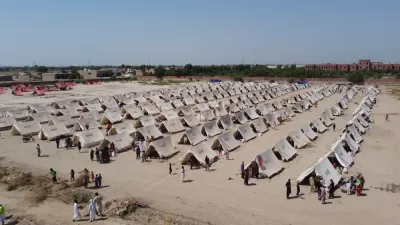Negotiators at this year’s COP27 climate change meetings can claim progress on some tricky issues, but stagnation reigns on the fundamental issue of emission reductions.

The latest round of United Nations climate talks, COP27, ended over the weekend, two days later than originally planned, with a mixed bag to show for the effort. While a deal was brokered on one of the “thorniest” issues facing nations—how to pay for the damages of climate change—the talks failed to achieve substantive progress on emission reductions.
Multiple national and international outlets reported on the conclusion of COP27, including the Associated Press, Reuters, and Vox. None of the media coverage emerging from COP27 flinches from the lack of tangible progress of emission reductions included in the Sharm el-Sheikh Implementation Plan.
United Nations Climate Change also released a press release focusing specifically on the creation of a “loss and damage” fund for vulnerable countries. “Governments took the ground-breaking decision to establish new funding arrangements, as well as a dedicated fund, to assist developing countries in responding to loss and damage. Governments also agreed to establish a ‘transitional committee’ to make recommendations on how to operationalize both the new funding arrangements and the fund at COP28 next year. The first meeting of the transitional committee is expected to take place before the end of March 2023,” according to the press release.
“Parties also agreed on the institutional arrangements to operationalize the Santiago Network for Loss and Damage, to catalyze technical assistance to developing countries that are particularly vulnerable to the adverse effects of climate change.”
The legacy of COP27 will be known officially as the Sharm el-Sheikh Implementation Plan. The plan assumes that a global transformation to a low-carbon economy will require an annual investment of $4-6 trillion. “New pledges, totaling more than USD 230 million, were made to the Adaptation Fund at COP27. These pledges will help many more vulnerable communities adapt to climate change through concrete adaptation solutions,” according to the press release.
FULL STORY: COP27 Reaches Breakthrough Agreement on New “Loss and Damage” Fund for Vulnerable Countries

Maui's Vacation Rental Debate Turns Ugly
Verbal attacks, misinformation campaigns and fistfights plague a high-stakes debate to convert thousands of vacation rentals into long-term housing.

Planetizen Federal Action Tracker
A weekly monitor of how Trump’s orders and actions are impacting planners and planning in America.

In Urban Planning, AI Prompting Could be the New Design Thinking
Creativity has long been key to great urban design. What if we see AI as our new creative partner?

How Trump's HUD Budget Proposal Would Harm Homelessness Response
Experts say the change to the HUD budget would make it more difficult to identify people who are homeless and connect them with services, and to prevent homelessness.

The Vast Potential of the Right-of-Way
One writer argues that the space between two building faces is the most important element of the built environment.

Florida Seniors Face Rising Homelessness Risk
High housing costs are pushing more seniors, many of them on a fixed income, into homelessness.
Urban Design for Planners 1: Software Tools
This six-course series explores essential urban design concepts using open source software and equips planners with the tools they need to participate fully in the urban design process.
Planning for Universal Design
Learn the tools for implementing Universal Design in planning regulations.
Gallatin County Department of Planning & Community Development
Heyer Gruel & Associates PA
JM Goldson LLC
City of Camden Redevelopment Agency
City of Astoria
Transportation Research & Education Center (TREC) at Portland State University
Jefferson Parish Government
Camden Redevelopment Agency
City of Claremont





























